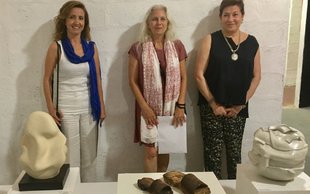
Taking Lebanese Ceramic Art to a Higher Place
Ceramics is getting more and more popular and this competition proved us...
The fields marked with * are mandatory
"Switching back to my guitar. A lot is on the horizon"
“Music is not only about music…it’s a way of living” "My music, political? Give me a break….Please!!”
If you think these quotes are intriguing, wait till you hear what musician/music producer/composer Raed El Khazen had to say about the music industry in Lebanon, the surprising advice he has for aspiring musicians and the voices he hears! (not those kind of voices….the inner voices every sane individual has or should have). In this interview, El Khazen shares the beginnings of his musical career in New York City, his journey back home and his take on the profound role music can have in life.
SoBeirut: Tell us more about how you came to be a musician/producer.
Raed El Khazen (R.K): I picked up the guitar during my first year studying at the American University of Beirut (AUB). Soon after that, I realized that it is what I wanted to be doing for the rest of my life. Slowly, I started slipping from the life that had been planned for me into who I wanted to be. Eventually I dropped out of AUB and a new chapter began. Being a producer came to me when I was in New York. It was a very natural thing for me. I remember the moment quite vividly; I was recording bass and guitar in a Long Island studio, and during the session the little voices inside my head spoke once more: You should become a producer.
And just to clear the record, I'm a music composer as well. I write music for TV and film.
SoBeirut: What kinds of music do you play/produce/compose? Not to put you in a box, but how would you describe your “style”, if any? Is there a common thread to your music?
R.K: I was never into styles, neither as a listener nor as an artist. I fortunately just like good music or at least what I'd consider as good music. So I could never adhere to playing one way or out of a style, plus I really don’t like boxes. They are a necessary tool for advancement but not a status to exist in. They are styles with a name because they happened. Then we gave them a name. At the time they were happening they were just a reaction to the present. The result is that whatever I do is bastardized to the ear of a purist; but the nice part is that it's bastardized by me. And I find that this particular addition is what it means to be creative. Imitate, emulate, and create. I feel I'm starting to enter phase 3. And that way of thinking trickles into production and writing.
SoBeirut: Who are musicians –past or present- who have influenced your work or inspired it?
R.K: Miles Davis and Jimi Hendrix - evolution
Monk - innovation
Keith Jarrett - mastery
SoBeirut: You studied at one of the most prestigious music colleges in the United States and lived there for 14 years; what made you come back? We can’t imagine there would have been a shortage of career opportunities for a Berklee grad in the US…
R.K: It's the voices again (with a smile). I felt I learned and experienced a lot in the US and that it was a blessing for me. If you don't share the love, you don't fulfill your part of the give-and-take formula, and that makes you ungrateful.
SoBeirut: What do you think of the current music industry in Lebanon?
R.K: It's moving. It's shaking. It's trying to get out of the status quo. It has an identity problem that is slowly resolving. I look forward to the coming decade.
SoBeirut: You said and I quote “music is serious business”. What do you mean by that?
R.K: It's a way of living. The Music is not only about music, it's about U and your relationship to life translated into a medium. So assuming responsibility for what it really is would be serious business (smiling). It's a commitment on so many levels that are all intertwined.
SoBeirut: How do you define music? Do you think music has a social role beyond entertainment?
R.K: Music in itself is more a spiritual experience. I personally don't believe in political music too much. I feel it pigeonholes the artist. On the other hand, the artist is a political agent. Just the fact of living to accommodate the vocation will set them apart from the norm and therefore they become a political statement themselves.
SoBeirut: How can we, as listeners, help restore the balance in favor of meaningful music?
R.K: Attend, push, support, discern and promote good music. And most importantly, listen when we attend.
SoBeirut: What would you say to those who label your music as political?
R.K: Give me a break ...... Please!!
SoBeirut: You have helped regional artists grow on the musical stage, what advice would you give an up-and-coming musician?
R.K: Work, work, work! Practice, explore, write, read, listen and most importantly live fully!!!
SoBeirut: What’s next for Raed El Khazen?
R.K: Switching back to my guitar. A lot is on the horizon. Will keep U posted J
SoBeirut: Switching gears now to our favorite country – and possibly yours? - What are your favorite spots in Lebanon? Feel free to share all.
R.K: Metro al Madina, Mezyane, Station and Radio Beirut.
Articles
Interviews
Occupation
Artist
Get updates on what's happening in Beirut, customise and review the content you want.
Sign up now! It's free!